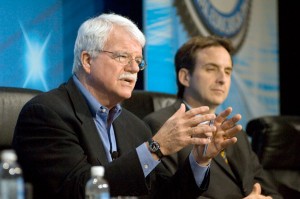 Yesterdays we covered the Education and Labor Committee Hearing on “The Economic and Employment Impact of the Arts and Music Industry“. Today we have a recap of what was said at the hearing.
Yesterdays we covered the Education and Labor Committee Hearing on “The Economic and Employment Impact of the Arts and Music Industry“. Today we have a recap of what was said at the hearing.
The hearing was held to examine how the economy is affecting jobs in the arts and music industry and the roles these industries play in communities across the country. The hearing was lead and opened by Chairman, George Miller (D-CA). His opening remarks covered how the non-profit arts and culture industries inject over $166 billion into our economy each year, according to a recent study by the Americans for the Arts. Those sectors support 5.7 million jobs and over $104 billion in household income. Spending by non-profit arts and culture organizations provide work for more then just artists, curators, and musicians – they also directly support builders, plumbers, accountants, printers, and an array of other occupations.
Chairman Miller also pointed out that the unemployment rate for artists is double that of other professional workers. In the last quarter of 2008, the unemployment rate for artists grew by 64 percent – for a total of 129,000 displaced workers.
Witnesses of the hearing included respected members of the entertainment and art communities with specific points of interest regarding how the industry is effected, and can rebound and become sustainable with Government funding.
U.S. Representative, Louise M. Slaughter (D-NY) who pointed out the the arts and music industry creates a hub of economic activity that helps an area become an appealing place to live, visit and conduct business while also creating jobs, attract investments and generate tax revenues to stimulate a local economy. Rep. Slaughter also noted that the overall non-profit arts and culture industry generates $166.2 billion in economic activity each year. Thus supporting 5.7 million jobs and generating 29.6 billion in government revenue.
Michael Bahr, Education Director of the Utah Shakespeare Festival showed how Cedar City where the Utah Festival resides relies on the festivals summer long production season as a means of revenue by pointing out that patrons generate 30 to 50 million dollars for the local economy through lodging, dining, shopping, fuel and recreation on top of the ticket sales for the festival. By cutting two weeks from the Utah Shakespeare Festival season, the materials, personal and resources provided by the community are less then normal and effecting the entire communities revenues. Mr. Bahr also points out in his testimony that Art is not a luxury, it feeds our souls and our families. It informs and educates our citizens.
Tim Daly, Actor and Co-President of the Creative Coalition stated that the entertainment industry is United States second largest export. Mr. Daly laid out a three step process to ensure the continued vibrancy of the arts and entertainment industries.
- Federal support for the arts by expanding funding for the National Endowment for the Arts (NEA) and encourage support for the not-for-profit arts sector.
- Nurture the next generation by giving our children access to art in schools. While not promoting a career in the arts but to give children a chance to exercise the imaginations to nurture creative thinking and innovation.
- Change the discussion about the arts in our culture. The arts are interwoven with engineering, with innovation, with technology, and these creators are part of our economic and cultural main course.
Other witnesses of the hearing and that gave testimony are the following:
- Joanne Florino
- Executive Director – Tridad Foundation, Inc.
- Robert L. Lynch
- President & CEO – Americans for the Arts
- Michael Spring
- Director – Miami-Dade County Dept. of Cultural Affairs
- Bruce Ridge
- Musician & Chairman – International Conference of Symphony
- John Thomasian
- Director – National Governors’ Association – Center for Best Practices
Each Witness gave testimony of how important the Arts play a part in the economy and how government funding is not only important, but a necessary requirement to help stimulate and get our economy back on track.
There are additional hearings to be held during the course of the spring. Look for updates on this key issue here at iSquint. To read the written testimony from each member and witness, be sure to visit the Committee’s hearing page. Also listed on the hearing website is the full video of the hearing from yesterday.
LatestHeadlines
- Upgrading Your Toolbox: City Theatrical DMXcat-E and DMXcat Multi Function Test Tool
- Claypaky Bringing Back the Sexy to Par Cans with the Midi-B FX
- Ayrton Evolves the Cobra, the Cobra2 Developed for the US Market
- MA Lighting Intros grandMA3 onPC Fader Wing and DIN-Rail Nodes
- Live Events LEVL Up Fest: A Festival to Aid our Industry